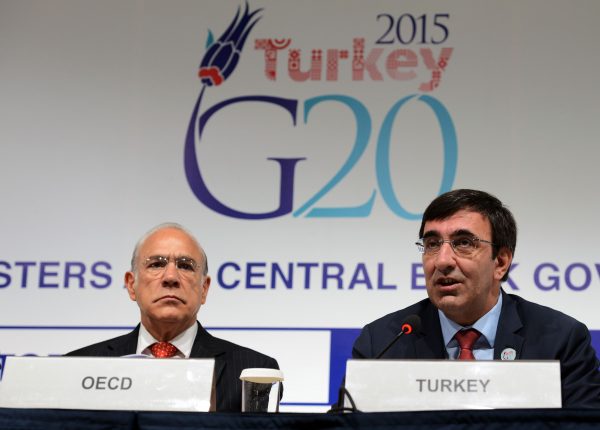And it will institutionalise the G20 through a new ministerial forum for energy, an SME Forum and a Women’s Twenty engagement group. It will also act on the immediate political security crises of terrorism and Syrian refugees.
At the core of its built-in agenda will be generating strong, sustainable, balanced and now inclusive growth, to counter the slowdown in global economic growth and trade, the recession in Russia and Brazil, and the still sluggish recovery in the advanced G7 countries. To get back on track for the 2014 Brisbane Action Plan (BAP), in the face of declining baseline growth and their own incomplete implementation, the 2015 G20 summit will promise new measures on infrastructure investment, trade and structural reforms.
Fiscal sustainability, spillover sensitive monetary policy and market oriented exchange rates will be endorsed. Stronger, more harmonised financial regulation and supervision will be approved. There may also be a recognition that climate change threatens the global financial stability that the G20 was created to preserve. Leaders will again endorse reform of international financial institutions and trade liberalisation through major plurilateral and regional agreements, such as the recently negotiated Trans-Pacific Partnership, as compatible building blocks for the long awaited arrival of the multilateral Doha Development Agenda at the WTO.
To improve domestic resource mobilisation, anti-corruption, economic efficiency and fairness, leaders will adopt the next stage of the OECD’s work on base erosion and profit sharing. This program is designed to ensure that all firms pay their taxes where their production and profits actually arise.
Inclusion will be identified as an important cause of, rather than constraint on, economic growth. This will mean that the BAP commitments will now be implemented in the most inclusive, jobs-rich way. A key feature of this new approach will be a hard won agreement to increase youth employment by 15 per cent by 2025. This will be accompanied by new measures to boost the status of jobs-generating SMEs and entrepreneurs, as well as programs to increase the participation of women in the workplace by 25 per cent by 2025, as promised in 2014.
To promote access to electricity for the more than one billion people who now do without, leaders will support the 17 new Sustainable Development Goals (SDGs) launched at the UN in September. As part of the SDGs there will be a focus on energy for the first time. In the wake of the Ebola epidemic, they may also address the third SDG on health. But the G20 will struggle to implement their 2009 commitment to end fossil fuel subsidies and to mobilise climate finance to help make the UN’s landmark climate change summit in Paris in December 2015 a success.
At their opening dinner, leaders will consider how to better care for the millions of refugees from Syria, with two million already residing in Turkey and many more arriving daily. This concern will probably extend to the root cause of the refugee crisis — the brutality of the so-called Islamic State and the Assad regime in the civil war in Syria and Iraq, and of similar terrorist groups elsewhere.
To help the G20 implement its goals, leaders will introduce a new mechanism to monitor the delivery of the most important of the BAP commitments. They will look to international organisations such as the OECD, WTO and International Labour Organization to assist in other fields. They could also ask their civil society engagement groups, notably the new Women’s Twenty, to help. Leaders will further endorse and perhaps enhance the newly created Women’s Twenty, the SME Forum to further institutionalise the G20. Leaders will also extend the G20’s energy ministers meeting and may make their trade ministers’ meeting a regular annual event.
During the summit, G20 government heads will meet with those from all the engagement groups. The design of the 2015 summit will also aid progress. By lengthening the time G20 leaders spend together and designing the opening dinner as a more spontaneous, leaders-driven session, Antalya will mobilise the strengths of the more established, compact and cohesive G7/8 club.
Spurring success will be the shocks from the conflict in the Middle East, terrorism and the Syrian refugee crisis, as well as the failure of the UN’s major multilateral organisations to adequately respond. The prospects for a successful summit will be further bolstered by the predominantly collective and relatively equal internal structure of the G20. Antalya’s central achievements on inclusiveness will uphold the G20’s distinctive foundational mission of making globalisation work for the benefit of all. In sharp contrast to then Australian prime minister Tony Abbott in 2014, this G20 summit will be chaired by G20 summit co-founder and veteran, Turkish President Recip Erdogan, fresh from an election victory on 1 November. Antalya will again show the G20 as a group of equals that is steadily becoming a club. China will be able to build upon this solid foundation as the 2016 chair.
John Kirton is Co-Director of the G20 Research Group and Director of the G8 Research Group at the University of Toronto, where he is a Professor of Political Science. The G20 Research Group’s official publication G20 Turkey: The Antalya Summit 2015 can be accessed here.

